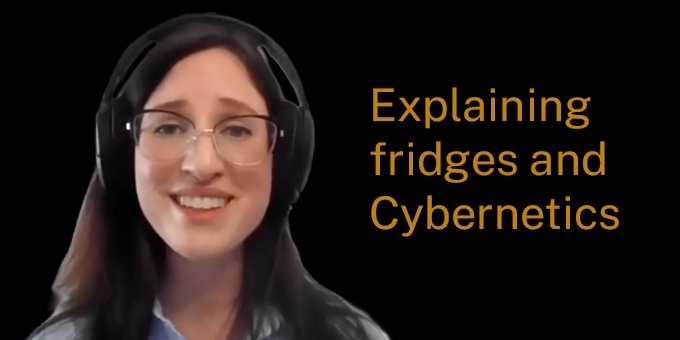Have you ever stopped to think how your fridge works, in one of those (inumerous) times you opened the door looking for a snack? And that maybe the way you use your fridge is different from how a restaurant’s chef or hospital’s nurse would do it? Using fridges and multiple perspectives, Dr Kelly Frame, from the ANU School of Cybernetics, held an interactive session explaining the basic concepts of the discipline to two very different audiences earlier this week. Firstly, International students from India, Middle East and more, during the ANU International Student Week., followed by the 2021 Get Set event with Y9-10 female students from regional Australia. But as the academic explained, “all they needed to participate was a device and their unique imagination”. You can watch her in action on Youtube – Dr Frame’s presentation for the international audience starts at 7:03.
Cybernetics explores how people think about systems and how to balance technology, culture, and ecological dynamics. Dr Frame shared three key cybernetics tools with the guests: 1) Seeing the System; 2) Inviting multiple perspectives; 3) Asking good questions. With that in mind, the groups discussed the function of a well-known appliance (fridges) and how they could serve their purpose better – with the idea of “better” being completely open to interpretation. “Participants brought their unique perspectives and imaginations to the challenge of designing a refrigerator for a better future”, said Dr Frame. “The international cohort presented ideas for environmentally-friendly fridges that were powered by sustainable energy sources and boasted smart features for limiting food-wastage. The student cohort empathised with different stakeholder needs, reflecting on the importance of accessibility in terms of cost and the varying needs of medical, domestic, and commercial kitchen applications.” Responses varied and guests were not afraid of challenging assumptions during the tasks: one even asked if a fridge was actually needed, or if they could just bring an eski. The diversity of thought highlighted the importance of engaging with different audiences, and from an early age. “Cybernetics helps young people to identify the human, technological, and ecological factors that inform and drive the complex systems that shape their lives, and it is only from this position of understanding that they can take action to create changes for a better world”, Dr Frame concluded.

